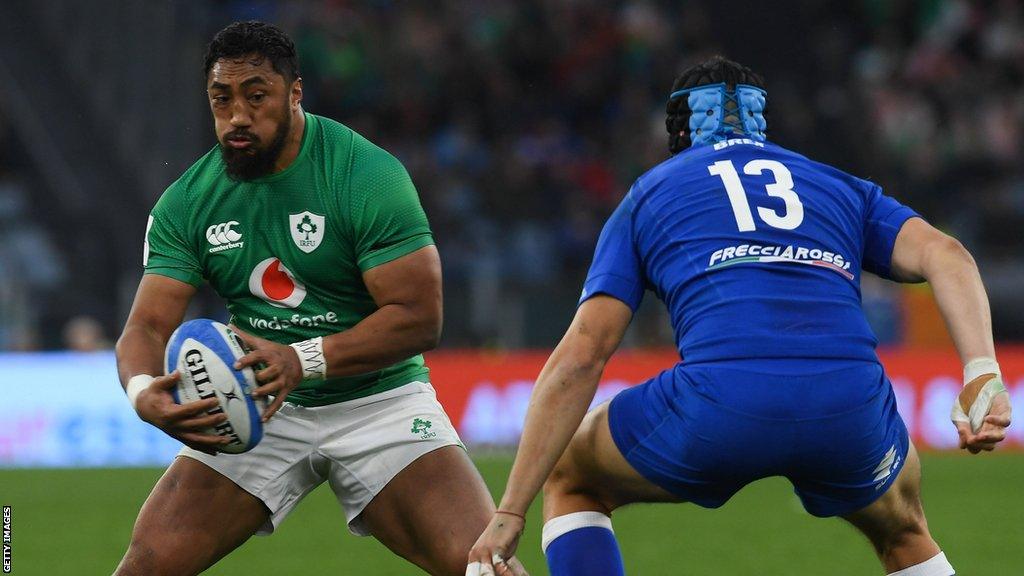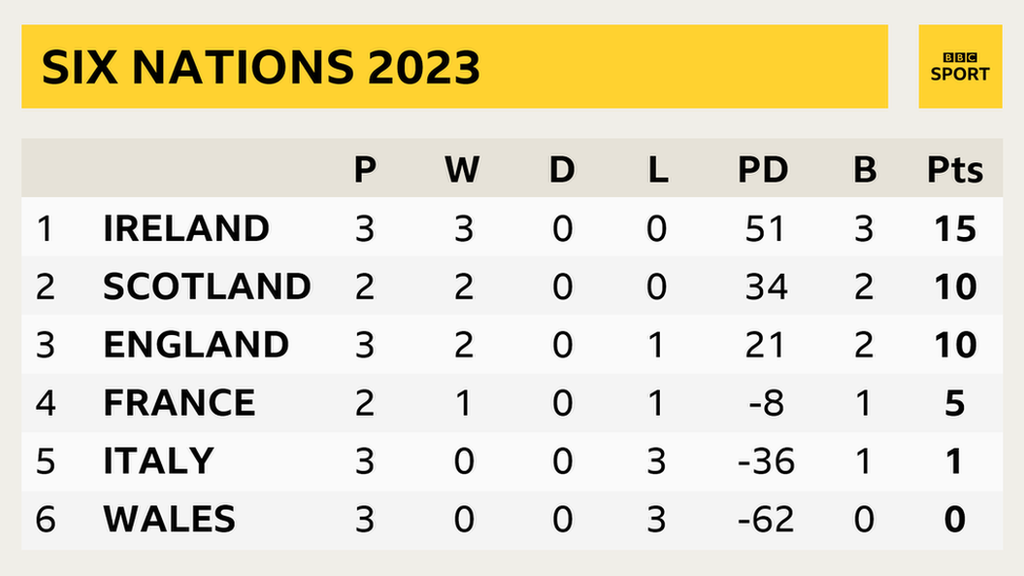Six Nations 2023: 'Grand Slam still in Ireland's sights despite nervy Italian job'
- Published
- comments
Six Nations 2023: Highlights: Italy 20-34 Ireland
It is telling that, after outlasting a defiant and spirited Italy, Ireland head coach Andy Farrell spoke about his team's ability to stay in the game, show character and find a way.
For Ireland have rarely been required to lean on such attributes against regular Wooden Spoon recipients Italy in recent years.
But on Saturday in Rome, Italy did not look like a team who have often been looked upon as whipping boys in this championship, nor did Ireland resemble the world's best team as they rode their luck to avoid a repeat of 2013.
In previous meetings, Ireland have usually scored and kept on scoring. Last year, they bagged nine tries. The year before it was six.
Here, Ireland crossed five times, but the key difference was their failure to swat away a much-improved Italy while failing to convert chances of their own.
"They don't go away anymore, do they?" said Farrell, who spoke of his relief at winning what he labelled a "proper Test match".
After the thrill of a scintillating heavyweight win over 2022 Grand Slam winners France two weeks ago, Farrell unsurprisingly used the Rome Test to shake things up a bit with six changes.
The ensuing performance led one to think about November's meeting with Fiji in Dublin.
Like in Rome, Ireland went into that one on the back of a huge win over a glamorous team (South Africa) with Farrell opting to make wholesale changes. Against Fiji, Ireland were sloppy, their defence prised open by well-worked attacks.
Ultimately, they dug deep to avoid a major upset. At the Stadio Olimpico, they were forced to do exactly the same.
Ireland started well, of course, with James Ryan marking his seventh outing as captain with the opening score after a second-minute James Lowe effort had been chalked off.
But straight from the restart Ryan spilled the ball and swung momentum back in Italy's favour, the hosts eventually scoring through Stephen Varney.
The next score came through Ireland's flying full-back Hugo Keenan, but Italy responded with a Paolo Garbisi penalty after Mack Hansen was penalised.
Hansen atoned, however, with the bonus-point score after Bundee Aki had crossed, and at that stage it looked as though Ireland were finally seizing control.
But Aki blotted his own copybook when his attempted pass to James Lowe was intercepted by Pierre Bruno, who ran under the posts from 65 metres to keep Italy's hopes of a famous win alive.
Italy continued to execute the kind of exciting, uninhibited rugby that has won them plenty of admirers since the start of this year's tournament, while Ireland were their own worst enemies at times in a display that showed holes in the great green juggernaut.
"You take all the emotion out of the game, I think Mack Hansen dropped a ball clean just before half-time, James Lowe's dropped a ball over the try-line and we gave an intercept try away," said Farrell, pinpointing the lack of killer instinct in Ireland's performance.

Aki scored a try but struggled at times in defence in a mixed performance
The Irish were also not helped by a midfield partnership of Aki and Stuart McCloskey put together at the last minute, that yielded mixed results.
Following Garry Ringrose's injury-enforced withdrawal on Friday, Farrell moved Aki to outside centre and promoted McCloskey from the bench to take the No.12 jersey having started the first two games there.
While Aki scored a fine first-half try, he knocked the ball on while straining to score a second and was guilty of contributing five to Ireland's missed tackle tally of 27.
"Some good, some improving to do," Farrell offered as an honest appraisal of the Aki-McCloskey dynamic.
"I thought defensively we were a bit off at times, certainly set-piece wise etc, but some good in that regard. Stu and Bundee individually made some good in-roads.
"It's a new partnership coming together with a new half-back partnership. It's always going to be tested under pressure when you are playing against a good side like that."
'We have to be better'
The aforementioned new half-back partnership was, of course, Ross Byrne and Craig Casey, which accounted for a healthy slice of the pre-match build-up.
Both gave a good account of themselves. Byrne, the first Ireland player to appear for the warm-up, appeared to speak assertively in the pre-match huddle, and while he missed a couple of kicks, he has acquired the invaluable experience of navigating through a see-sawing championship battle from the start.
Like Byrne, Casey will almost certainly be afforded further opportunities in the future, but with the expected return of Jamison Gibson-Park for Scotland Farrell may be able to call upon a fully established operator at scrum-half.
Farrell will also receive a major fitness boost if he has his first-choice centre pairing of Ringrose and Robbie Henshaw back for the Scotland game, while prior to Italy he expressed full confidence about Johnny Sexton and Tadhg Furlong's return.

Those are undoubtedly pluses, while Ryan highlighted another.
"We made it quite difficult for ourselves at times, particularly in the first half," he said.
"That's still a positive for us in a way because we're three from three, top of the table, but there's still a lot more for us.
"We have a good two weeks to get ready for Scotland and we have to be better."
As obvious as it sounds, Ryan is right. Ireland's fragilities were put under the Italian microscope, but they emerged from the Eternal City with a third win, the first time they've gone three from three since the Grand Slam-winning campaign of 2018.
Farrell's fingernails may not be what they were, but Ireland's dream remains intact.
It is often said the great teams find a way to win. They also use underwhelming performances to sharpen the mind and avoid a repeat.
That's the task facing Ireland now as they look toward Murrayfield and a Scotland team one win away from their first Triple Crown since 1990.